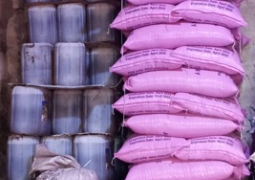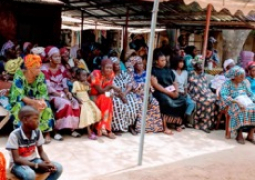
This has led to the frustration of many citizens, especially the underprivileged families within the seven regions of the country.
The Central Bank in a recent Monitory Policy Committee (MPC) press briefing held on the 27th of May 2021, revealed that consumer price inflation of food and non-alcoholic beverages accelerated by 1.5%, points to 8.5% in April 2021 and from 7.0% a year ago attributed to increases in most components of food inflation, notably oils and fats.
“Similarly, non-food inflation increased to 6.1% in the review period, from 3.3% a year earlier. The spike in non-food inflation is explained by a rise in the prices of housing, water, electricity as well as other fuels and communication services,” Governor Buah Saidy stated.
Some of the recent prices under Barrow’s government compared to the past Jammeh’s rule have no doubt seen some huge differences: a bag of rice that was costing D900 before Barrow came to power is now sold at D1650, a bag of onion was 400 and now sold at D800, a gallon of oil that used to cost D900 is now at D2, 000. A bag of charcoal was D175 as opposed to D350 now. A cartoon of chicken was costing D600 but it is now D1, 000 among other basic commodity prices.
Fatou Njie, a vendor at Latrikunda Sabiji Market confirmed to this medium that food items are escalating on a daily basis, saying this has impacted their businesses. According to her, the price increment starts from the importers.
“People like me; I don’t determine the price in the market. I used to buy my goods from the big business (warehouses) and if at any time they increase their goods, I must increase as well. If I don’t increase, then I wouldn’t have any profit from my daily sales. Warehouses do tell us they also buy it at high cost,” Mrs. Njie said.
She added that if the government put strict measures to curb the price hike, the citizens and underprivileged families will welcome the move.
This reporter has in several ways tried to speak to the relevant authorities at the Ministry of Trade, Regional Integration and Employment (MOTIE) but was directed to the website where little information can be obtained.
MOTIE recently informed the public, especially the importers of essential commodities that the essential commodity Act enacted in 2015 is being brought into force. The Act aims to regulate the importation, distribution, and retailing of essential commodities to ensure availability at fair and reasonable prices.
The Ministry further stated on their website that as part of monitoring commodity prices, they observed the continuous hikes in the prices, especially cement.
“The ministry has conducted a series of consultations with the relevant stakeholders, and it was confirmed that there is a disproportional increase between the wholesale and retail prices of cement. The factory price ranges from D265 to D285, whilst the retail price has ranged from D340 to D400,” the ministry indicated in a March post.
The authorities further added that; “The essential commodities Act enacted by the National Assembly in 2015 serves to ensure that, in the interest of the public, the importation, distribution and retailing are fair and reasonable. All importers, distributors, and major retailers of the following essential commodities Rice, Sugar, Oil, Onions, Potatoes, Flour, and Chickens are reminded to obtain a license from MOTIE by the 1st of May 2012,” Ministry stated.
The Chief Executive Officer (CEO) of Gambia Chamber of Commerce and Industry (GCCI), Alieu Secka, in an interview with this medium, explained the reason for the rapid increment of essential commodity prices, saying since the inception of Covid-19, production was seriously interrupted, and the world literally locked down for several months.
He said commodities that were already shipped, provided a tremendous cushion for a large part of last year, while his Chamber provided assurances that there were sufficient stocks for consumption and no need to panic at that moment.
“A few months further, the lack of production started to indicate that supplies were beginning to be low and many industries and producers try to meet the growing demand. The lockdown had a huge delay on sea vessels freight and containers could not be transported to consumer markets nor empties returned. In the meantime, Oil prices also went up and shipping lines increased their charges significantly, sometimes doubling it more.”
He told our reporter that these factors have added to the cost of commodity prices worldwide which is also threatening inflation and will hit consumers directly. He stated that as goods will be more expensive to buy, businesses will also not be able to sell as much and could affect their own survival.
On whether the government of the day failed its citizens for not regulating prices in the market, CEO Secka indicated that many of the reasons for the inflationary increase may be outside government control, while adding that worldwide governments have endeavored to provide policies and actions to stabilise costs including rationalisation of taxes, reduction of taxes, particularly promoting local content and indigenisation, making available cheap credit and subsidies to local entrepreneurs to build their capacities, granting big contracts to those with proven track record or credibility, mechanisation of agriculture, value addition among others.
He said he was aware of the proposed Ports development project, which calls for urgent action to overcome complaints from shipping lines and major importers about serious congestion at our Ports resulting in delays, increased charges, and re-routing from Banjul.
Buttressing about the solutions for the hikes in prices, Mr. Secka advised that the country must produce more of what we consume by investing in mechanized agriculture, providing incentives for importers to invest in value addition including processing, packaging, and high standards in health, safety, and hygiene.
“The basic rule of economics will come to play with more local supply or once the shortfall in the current imports matches our consumption demand, otherwise the reverse drives inflation, which currently is about 8% way above what we were used to. We must further intensify industry scaling-up by giving incentives to local entrepreneurs for affordable inputs, credit and support their investments. We should also prioritize our infrastructure development of building roads which create employment for our communities and income, so that they can afford basic goods, pay taxes which in turn helps our economy,” Secka advised.
During the first republic led by late President Sir Dawda Kairaba Jawara, the country’s socio-economic economy was accelerating and mainly obsessed by an increase in the agricultural sector, which led to the diminution in basic commodity prices around the country. The citizens then commended the affordability of essential goods in the market and forestall for the empowerment of local goods, especially own grown foods like rice, maize, onion, tomato, coos, and more.
At a commencement of a new government led by the military junta in the second republic under the leadership of Chairman Yahya Jammeh, who later ruled the country for 22 years with several tortures, unlawful detentions, disappearances, and killing of innocent lives within the country. At the time of Jammeh’s rule, the country’s economic growth projected slowly and we were mainly dependent on loans and grants. Despite being in a very bad economic situation, Jammeh was able to regulate essential commodity prices. At some point, Jammeh would appear on political rallies or state television on some occasions and warned vendors/shopkeepers to maintain the right prices stimulated by the government.
After the inauguration of President Adama Barrow, many Gambians, especially young people were optimistic for the future of the country. Initially, the prices of essential commodities were not increasing but after four years of ruling, the masses found it difficult to survive due to the rapid increase of goods in the market without government intervention.
The prices are still not controlled or addressed by President Barrow’s government at the time of going to press.





